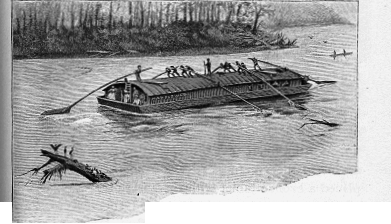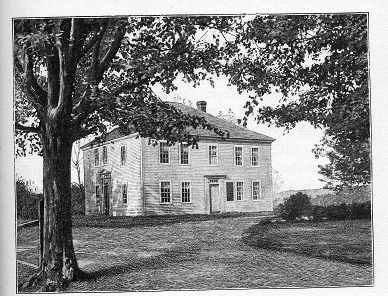Chapter 20 |
Six years after George Washington saw the light in his father’s rambling Virginia farmhouse beside the fair Potomac, there was born in the village of Sutton, in the heart of Massachusetts, a boy who was destined to be an efficient helper to Washington in the years to come, to be the founder of a great State, an earnest apostle of freedom, the promoter, if not the father, of the prosperity, progress, and dignity of the great Northwest. His name was Rufus Putnam. Israel Putnam, that stout old hero of the Revolution, was his cousin, but the guidance and the success of the Revolution were, it is claimed, more directly due to this simple farmer boy of Sutton than to the brave old wolf-fighter of Connecticut, the king-fighter of Bunker Hill and Long Island and New York. Self-taught and self-made, Rufus Putnam gained what little education he had by blacking the boots of the guests at the Sutton tavern of his hard-fisted stepfather, spending the few pennies he thus earned in gunpowder, with which he killed partridges, and with the money earned by the sale of these game birds buying for himself a primer and an arithmetic. These he 174 |
|
175 studied by the light of the tavern fire, and, with this rudely acquired knowledge as a basis, learned to read and reason. He became a blacksmith’s boy at Sutton; then he went to Brookfield as apprentice to a millwright; and, still studying whenever he could make the time, taught himself arithmetic, geography, and history, until he became able to extend his knowledge to advanced mathematics and engineering, for which he had an especial taste.A big, six-foot country boy, strong and athletic, was young Rufus Putnam. Few could overcome him in a wrestling match, or " stump" him with a tough problem in mathematics. He fought in the French War when but nineteen, saved enough from his bounty money to buy him a farm, married, and settled in the town of Rutland in Worcester County; and when the shot at Concord awoke Massachusetts to resistance and revolution, he joined the hastily formed camp of the Americans at Cambridge as lieutenant colonel of the Worcester County regiment.Here he attracted the attention and won the respect of Washington. His engineering knowledge was called into speedy service, and he was selected to construct the defenses thrown up around Boston by the patriot army. Chief among these were the notable works constructed, almost in a night, upon Dorchester Heights, commanding the beleaguered city; and so well were they constructed by this self-taught, unskilled engineer that Howe in dismay retired from his now unsafe |
|
177 position, and the first actual victory of the Revolution was rendered possible by the energy and genius of the unscientific but practical farmer of Rutland. It was Putnam, also, who planned and executed the defenses of Providence and Newport, and the greater and more surprising fortification of West Point, that most important post of the American defenders of the Hudson, which prevented the separation of New England from the rest of the country,—a scheme desired by the British ministry, and tried, only to end in failure, by. Howe and Burgoyne and Clinton. Of this self-taught Massachusetts farmer Washington declared that he was the ablest engineer officer of the war, whether American or Frenchman. With the close of the Revolution Putnam returned to his farm, and became a useful and honored citizen of Rutland. He was sent as representative to the Great and General Court; he served his town as selectman, constable, and tax-collector; he was made a State surveyor, and a commissioner to the Maine Indians, and when the popular protest against authority developed into the worry of Shays’s rebellion, the former continental general shouldered his musket and marched away as a volunteer. But Rufus Putnam appreciated both the hardships and the needs of the people; and when the talk about the public lands in the Ohio country began to attract public attention, he saw in the great domain a field for settlement, development, and successful labor, while at the same time he recognized that the only way to occupy and improve those fertile Western lands prop- |
|
177 erly was by systematic colonization rather than by individual and unorganized attempts at settlements. So Rufus Putnam "planned and matured the scheme of the Ohio Company," and through the years from 1783 to 1788 strove persistently to interest his countrymen in his idea of territorial development, and to enlist them in the founding of a new State beyond the Alleghenies.Putnam had been one of the first to urge upon Congress, too poor to pay in money, the apportionment of certain sections of the public lands as payment to the soldiers of the Revolution for their services in the war just closed. He had prepared and headed a petition, signed by two hundred and eighty-eight officers, asking for a tract of land in the Ohio country "of such extent, quality, and situation as may induce Congress to assign and mark it out as a tract or territory suitable to form a distinct colony of the United States, in time to be admitted as one of the Confederated States of America."This petition was forwarded to Washington by Putnam, and with it the wise engineer sent a letter suggesting a plan of national defenses and fortifications that would, if then begun by Congress, have committed the republic to such a systematic preparation for defense and war in days of peace as would have saved the outlay in blood and treasure which the neglect to accept Putnam’s plans has cost the nation. Washington eagerly supported Putnam’s petition; other Massachusetts men became interested in and identified with it; but, as Congress delayed as usual, Putnam and some of his associates themselves "took |
|
178 the initiative," and planned for the purchase of the Ohio land by an association to be known as the Ohio Company. This company was made up almost entirely of Massachusetts men. Planned in the old Putnam farmhouse at Rutland, it was duly agreed upon and incorporated in Boston, when, on the 1st of March, 1786, in the famous "Bunch of Grapes" tavern, at the corner of Kilby and State streets, delegates from the various counties of the Old Bay State met to discuss and sign the articles of association. Rufus Putnam and Manassah Cutler, Timothy Pickering and Benjamin Tupper, Samuel Parsons and Fisher Ames, Rufus King and Jonathan Meigs and Nathan Dane,—these were a few of the Massachusetts men who pushed forward to organization and completion the settlement of the new lands on the Ohio, and helped to found what has since developed into the great and powerful Western States of the American Union. The leading figures, however, in this vast enterprise so fraught with good for their native land, were Rufus Putnam of Rutland and Manassah Cutler of Ipswich. They formed the plans, laid the foundations, and organized the active measures that led to the settlement of Ohio and the West; they carried through the cession and purchase of land, secured the passage of an ordinance for the government of the territory, and drew up and fought through to adoption that most marvelous of public measures, known as the "Ordinance of 1787,"—a form of constitution for the new colonies of the Union which saved the republic from becoming a great slave- |

179 holding empire, and turned, as Senator Hoar expresses it, "the mighty stream and current of empire from the channel of slavery into the channel of freedom, there to flow forever and forever" While Manassah Cutler pushed through Congress this foundation of an empire, Rufus Putnam, in his Massachusetts home, was organizing the emigration. The first party of colonists was finally gathered, and, leaving Danvers in December, 1787, was later joined at Pittsburgh by a second party of pioneers. There, embarking on a flatboat, or galley, especially built for |
|
180 was captain, launched by Massachusetts men in the interests of liberty, union, and progress, was properly named; for the men of Massachusetts were, in their turn, following the traditions of their fathers of that first Mayflower compact, sailing westward to plant in the almost unknown wilderness a colony founded on liberty, equality, and the rights of man. The old house in the village of Sutton in which Rufus Putnam was born has long since been destroyed; but the house at Rutland, in which his active life was passed, where he dreamed over and practically developed the scheme that led to the colonization and development of the great and free Northwest, in which he devised the plan that should exclude slavery forever from his new State, and which later found expression in the immortal "Ordinance of 1787," still stands amid its elms and flowers, backed by its rampart of lofty hills, in the pleasant village of Rutland; and upon the front of the house, to the right of the entrance, those who honored the name and memory of one who so notably advanced the greatness and glory of the republic have placed a bronze tablet with this inscription: "Here from 1781 to 1788 dwelt General Rufus Putnam: Soldier of the Old French War. Engineer of the Works which compelled the British Army to evacuate Boston and of the Fortifications of West Point. Founder and Father of Ohio. In this House He planned and matured the Scheme of the Ohio Company, and from it issued the Call for the Convention which led to its Organization. Over this Threshold He went to lead the Company which settled Marietta, April 7, 1788. To |

Thus from those hill regions of Massachusetts where Rutland stands, amid its companion villages of Paxton and Princeton and Oakham and Hubbardston, the exact geographical center of the commonwealth, went out the man who, with kindred spirits of the Old Bay State’s bone and blood, infused into a great movement the very breath of life and achievement. Thus Massachusetts played the controlling part in the great Western movement, from which came that steady growth which, by successive stages, evolved the States of Ohio, |
|
182 Illinois, Kansas, Colorado, and Oregon, and gave so lavishly of her life and sinew that there is to-day more real New England blood beyond the Alleghenies than along the Atlantic coast line. Thus she helped to develop the republic from the little colonial strip that edged the Atlantic to the great nation that stretches across the continent. For Rutland in Massachusetts was the cradle of the West, and when Rufus - Putnam launched the second Mayflower he started the republic on its far-reaching career of possession, prosperity, and power. |